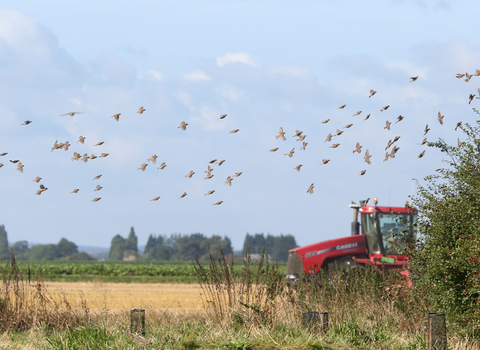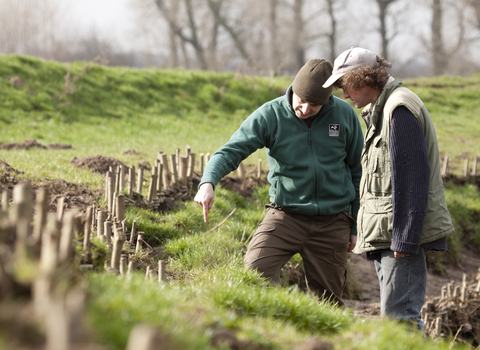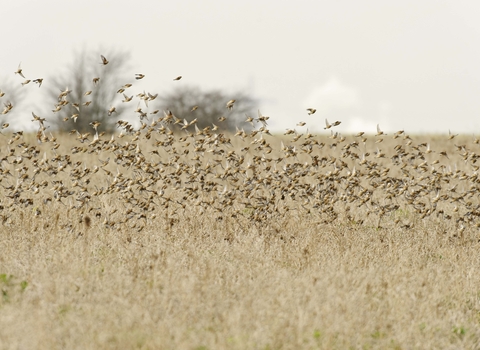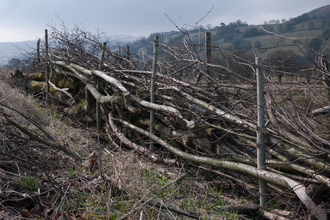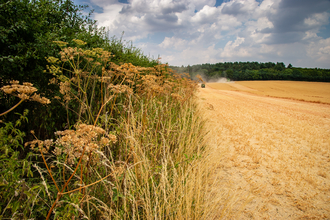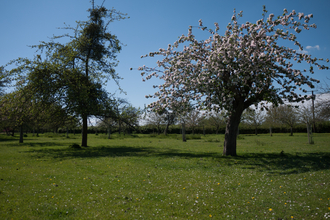Farming and wildlife
Over 90% of the land in Wales is farmed in some way – so how this land is managed has a big impact on wildlife.
Agriculture policy therefore shapes our countryside. For decades this has often been at the expense of wildlife and natural habitats by encouraging farmers to increase the productivity of their farmland and providing incentives that rewarded intensive practices. The Wildlife Trusts are working with farmers, landowners and the Welsh Government to change this. The recovery of wildlife in Wales depends on a farming policy which enables farmers to create and restore a thriving natural environment alongside domestic food production.
Farming at the Sweet Spot
Along with the Nature Friendly Farming Network (NFFN) and Nethergill Associates, we've examined how moving to nature-friendly farming can be productive and financially robust for farm businesses across the sector, along with how farming with nature can make you happier, healthier and wealthier.
You can also read our theory and approach in our annex.
Managing our own land and farms
The Wildlife Trusts in Wales manage over 200 nature reserves, covering more than 8,000 hectares of prime wildlife habitat, from ancient woodlands, grasslands, and wetlands to urban wildlife havens. On our nature reserves we practice sustainable environmental land management using techniques such as conservation grazing. Conservation grazing creates vegetation at different heights and small areas of bare ground. This encourages a wide range of wildlife in different habitats. It allows wldliflowers to grow, flower and set seed each year which provides pollen and nectar for invertebrates and increases insect food available for birds. The Wildlife Trusts in Wales own a variety of animals for grazing purposes including traditional and rare breed sheep and cattle, native ponies and even water buffalo. We also use local farmers to help manage wildlife sites. Grazing is the most natural form of management for certain habitats. Livestock can access areas that machinery can’t, and the impacts of grazing are slower than other methods, such as burning or cutting, which means that less-mobile wildlife can thrive.
The Agriculture (Wales) Act 2023
The Agriculture (Wales) Act became law in 2023. Several years in the making, Wildlife Trusts Wales and many other organisations have worked tirelessly to secure the best outcomes through the Act for wildlife and the environment. The Agriculture (Wales) Act provides powers to amend legislation derived from the European Union and established Sustainable Land Management as the framework for future agricultural support and regulation within Wales. Through the adoption of Sustainable Land Management future agricultural support will be consistent with the Welsh Government’s obligations under the Well-being of Future Generations (Wales) Act 2015. Sustainable Land Management is designed to ensure that resources such as soils, water and crops are used for the production of goods to meet human needs in such a way that the needs of the current generation are balanced with the obligations to future generations. The Sustainable Farming Scheme which is currently under development before coming into force in 2025 is designed to deliver outcomes which address the climate and nature crisis and promote the production of food produced in a sustainable manner. Whilst some successes have been secured, there is still much to do.
The Sustainable Farming Scheme has been designed to deliver on the principle of public money paying farmers and land managers to deliver public goods. Unfortunately this principle is now at risk of being watered down. These are things that society is considered to need, but that are not commodities that can be sold on the marketplace, such as flood alleviation, carbon sequestration through planting of trees or more wildlife. This is a big change in the way farmers are supported by the Welsh Governnment; and can be considered world-leading in its ambition.
The development and implementation of the Sustainable Farming Scheme in 2025 means the next few years will be critically important – as it is now that the real work takes place, finalising the programmes of work that will deliver the Scheme.. How much funding is available for the Scheme, particularly in those areas where farmers will be encouraged to collaborate at the landscape scale, what it actually pays for and what the scale of ambition is are all crucial details that need establishing before we can measure the true impact of the Sustainable Farming Scheme on our environment and natural world in Wales.
To assist the development of the Environmental Land Managements Scheme (ELMs) in England, The Wildlife Trusts commissoned a report with the Royal Society for the Protection of Birds and the National Trust to assess the true cost of meeting the UK’s priorities for environmental land management.
We also work in coalition with other organisations, such as Wales Environment Link which is a coalition of charities which formed to work together for wildlife across Wales.
Meet some amazing nature friendly farmers
Huw Foulkes
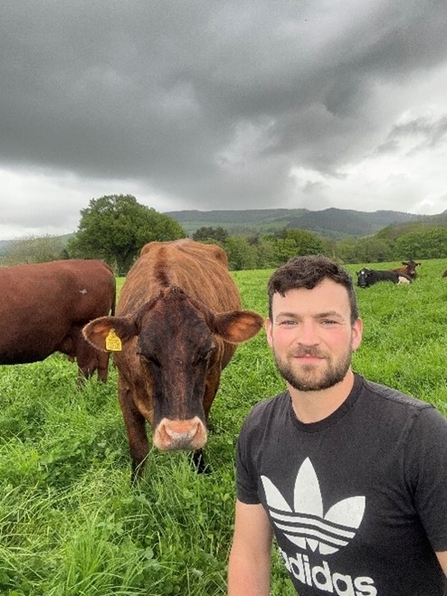
Huw Foulkes
With his herd of entirely pasture-fed dual-purpose Red Poll cattle, Huw Foulkes of Fferm Pentrefelin in Denbighshire takes a regenerative approach to dairy farming. In this cow and calf system, the calves remain with their mothers until they are naturally weaned, the cows being milked once a day. Huw’s first big move was to go completely organic and eliminate the use of fertilisers and chemical sprays, complemented by introducing nitrogen-fixing legumes, such as lucerne and clovers, into the farm’s pastures. Grazing management has also changed drastically, where Huw rotationally grazes the cows onto fresh grass every day, sometimes twice a day and also mob grazes. The introduction of trees onto the farm, and in particular a silvopasture trial, has also helped the farm become more nature-friendly. Huw is passionate about a regenerative approach to dairy farming, where animal welfare and environmental impact aren’t sacrificed for large milk yields and turnovers.
“I started farming like this because I sell directly to the public and have to listen to what my customers want. They have been telling me about their concerns for the environment which made me realise that I had to make the farm as sustainable as possible. Also, I wanted to secure a future for the business without having to rely on artificial inputs and supplementary feeds. I feel very fortunate to be farming and want to produce food in the most positive way possible and have the least negative impact on the natural environment.”
Owain Noble
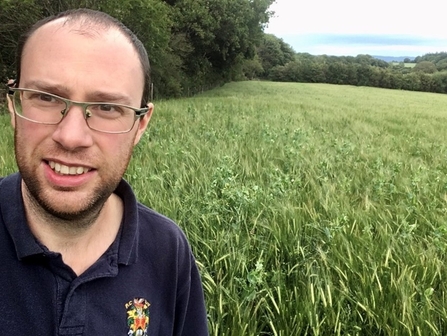
Owain Noble
Bryn Cocyn is a small mixed farm in the shelter of Moel Fodiar, overlooking the Vale of Clwyd. They have sheep, cattle, cereals, apples, soft fruit and vegetables. The farm has been in the same family for three generations. It is the oldest organic farm in North Wales. They have farmed organically at Bryn Cocyn since 1989 and are also tenants on some nearby hill land, which we have farmed organically since 1978. Their aim is to produce food in a way that will allow future generations to do the same, working with nature instead of against it and contributing to the local economy by selling through local shops and Farmers’ Markets. They believe that a high-yielding, efficient agriculture is essential to match the need for good food, but only to the extent that the soil and her laws of use-and-return can sustain!
“As a farmer I feel a responsibility to provide healthy food to a growing population, whilst caring for the environment we live in. I believe mixed farming, not relying on inputs but instead on livestock, cereals and horticultural systems working in harmony, can enhance biodiversity whilst protecting the air, soil and water we all rely on. This is what I am working towards on our small family farm. The pleasure of raising a healthy crop and seeing nature flourish, is also a strong motivation for me to farm Organically and sustainably”.
The Wildlife Trusts believe that by working together we can change the natural world, for the better
Advising farmers and land managers
Local Wildlife Sites
There are around 4,700 Local Wildlife Sites in Wales covering an area of more than 800 sq.km (equivalent to more than 4% of Wales). These are sites recognised for their importance for wildlife and which fall outside the legal protection of the Sites of Scientific Interest system (SSSI). Together with SSSI sites these form the core of a vital network of threatened habitats such as ancient woodlands, hay meadows and wetlands. These sites provide habitats for many of the Wales threatened and declining animal and plant species. Local Wildlife Sites provide refuges for a range of wildlife and act as stepping stones to link nationally important ecological areas.
As Local Wildlife Sites are often privately owned, they rely on the commitment of the landowners, farmers and volunteers who are prepared to carry out sensitive habitat management. Wildlife Trust advisors work with landowners and farmers responsible for Local Wildlife Sites to help them do this. Without such care and effort, a site will gradually decline and lose its diversity and abundance of species. Wildlife Trusts across Wales work, wherever possible, with landowners and farmers to help ensure Local Wildlife Sites are effectively managed for wildlife.
Water Quality
Wildlife Trusts in Wales are working with Welsh Water to help improve water quality which is impacted by farming.

